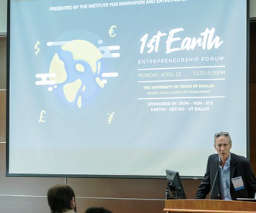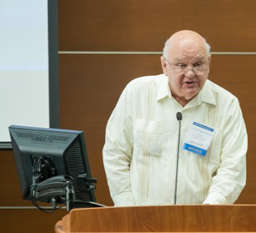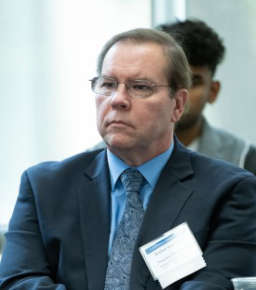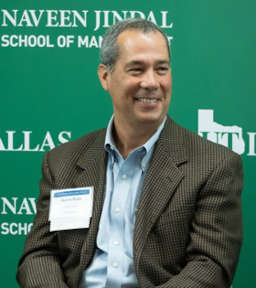
The University of Texas at Dallas kicked off its annual Earth Week festivities with several events on Earth Day, April 22. Prominent among these was the Earth Entrepreneurship Forum, during which speakers discussed the past, present and future of the energy sector.
About 220 students, faculty, staff and community members learned about traditional energy extraction, the connected grid, renewable energy, commercialization of energy-related research and opportunities and consumer trends related to geoscience and earth entrepreneurship.
Organized by the Institute for Innovation and Entrepreneurship, the half-day conference was presented by the Naveen Jindal School of Management, the School of Natural Sciences and Mathematics and the Erik Jonsson School of Engineering and Computer Science.
“Even though it was our first attempt at intersecting three academic programs with one big, themed event,” said Steve Guengerich, the institute’s executive director, “the content and speakers meshed nicely, with involvement and leadership from all three schools.”

Stephen Molina, director of the Jindal School’s MS in Energy Management program, introduced Dr. Walter Guidroz, the program coordinator of the U.S. Geological Survey’s Energy Resources Program. In his keynote presentation, “The Future is Now: What Are Some of the USGS Approaches in Adapting to the Needs of the 21st Century?” Guidroz provided an overview of the USGS, a federal agency that has among its mandates the task of conducting assessments of the nation’s mineral and energy resources. These include traditional sources, such as oil, gas and coal, as well as renewable energy, such as wind, solar, geothermal and nuclear.
USGS assessments provide the energy industry with data that allows it, Guidroz said, to take advantage of those resources. Notable assessments during the past few decades have included surveying shale gas reservoirs such as the Williston Basin that spreads across the Dakotas, Montana and into Canada, and the Permian Basin in Texas and New Mexico.

“They experienced phenomenal growth once technologies like hydraulic fracturing and directional drilling came into play,” he said. “And it allowed industry to extract much, much more in terms of resources than had been done previously.”
Guidroz explained that such productive periods in terms of growth in energy supply necessitate that the USGS reassess basins because previous surveys become out of date.
“It’s simply out of date because it had not taken into account the technology that [becomes] available,” he said.
Other presentations included panel discussions that discussed extraction of traditional energy resources such as oil, gas, water and minerals; smart technologies such as the internet of things that help improve energy efficiency in urban areas; and renewable energy derived from wind, the sun and outer space. Other discussions included how academia facilitates breakthrough research commercialization and consumer trends in earth entrepreneurship.
When asked what opportunities there are for UT Dallas graduates to become “energy entrepreneurs,” panelist Kevin Ryan, CFO of Merit Energy, defined the term from the perspective of a traditional, oil- and gas-focused company that deals in mature energy-producing properties. He said people might see that industry as stable and, therefore, not in need of an entrepreneurial mindset.

That is not true, said Ryan, a Jindal School 1995 MBA alumnus who is chairman of the Jindal School’s advisory council. “By the year 2040, there’s going to be 1.7 billion additional people in the world, and that’s going to require another 25 percent worth of energy use. So where’s that coming from? We’re going to need all sources of energy, not just oil and gas.”
Ryan explained that, even with long-utilized oil- and gas-extraction techniques, there are still inefficiencies that will require innovation to extract the remaining supplies from the ground. Entrepreneurial-minded graduates with good ideas can take advantage of these inefficiencies to create new products or services.
“I was very pleased at the response by speakers to join the program,” Guengerich said. “It was a wonderful array of business and technical leaders — many with UT Dallas degrees — from established larger firms to smaller startup ventures. They represented an amazingly wide range of topics, from satellite flight and mission control software to magnet recycling technology that produces rare earth minerals. In short, the ‘big tent’ theme of Earth Entrepreneurship worked really well to provide an informative and entertaining program.”





